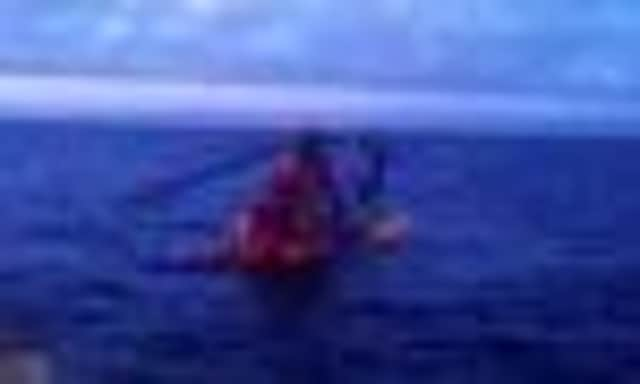Super Puma owners unite to ground fleet following North Sea ditching


• Three major North Sea helicopter operators have suspended all Super Puma flights
• French manufacturer to send investigation team to Scotland to probe helicopter ditching
Advertisement
Hide AdAdvertisement
Hide AdCHC Helicopters, which owns the helicopter involved in the rescue of two pilots and 17 oilmen off Shetland, was joined by Bond Helicopters and Bristow in announcing the suspension of all flights of the two models of Super Puma involved in North Sea operations – the EC225 and AS332L2 aircraft.


A CHC spokesman said 50 of its Super Pumas operating worldwide were affected by the suspension, including 16 of its 35-strong fleet of various types of helicopters operating in the UK.
Meanwhile, a team from the government’s Air Accident Investigation Branch (AAIB) arrived in Aberdeen to begin establishing the cause of the latest helicopter safety scare in the North Sea – the fourth major incident since 2009.
The inquiries are likely to focus on establishing whether a systems or mechanical failure on board the Super Puma EC225 was to blame.
Crucial to the investigation will be the recovery of the black box flight recorder and cockpit voice recorder, housed in the tail boom of the Eurocopter-
manufactured Super Puma, which remained afloat in the choppy waters off Fair Isle throughout the night.
It is likely to be several weeks before the cause of the controlled ditching can be established. But an industry insider claimed on an aviation industry website: “Although no-one has said what the ‘warnings’ were … the tone of the answers to certain questions points to the MGB [main gearbox] again.”
Earlier this month, an AAIB report revealed that a Bond-
operated Super Puma that ditched in the North Sea in May, 25 miles east of Aberdeen, had a faulty oil warning light. An initial AAIB bulletin also revealed that the gearbox shaft of the Super Puma EC225 was cracked.
Advertisement
Hide AdAdvertisement
Hide AdA tragedy in April 2009, in which 16 people died when a Super Puma AS332L2 crashed while returning from BP’s Miller platform, was blamed on a catastrophic gearbox failure.
Eurocopter, the French firm that manufactures the Super Puma, has sent a team to Aberdeen to assist in the investigation. A company spokeswoman said: “Eurocopter is working on this event with the highest priority together with the operator and the authorities.”
The ditching is to be discussed by union leaders, helicopter companies and oil industry officials at an emergency meeting of the oil and gas industry’s Helicopter Safety Steering Group in Aberdeen today. John Taylor, the Unite union’s industrial officer, said: “We go into this emergency meeting with serious concerns about whether these aircraft are fit for purpose.
“Mercifully, there were no fatalities, largely due to the skills of the pilot crew, the close proximity of the Nord Nightingale tanker … and the elements. They were lucky, but we can’t always rely on luck.”